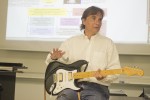Against his better judgement, Dr. Mark Tramo spent much of his time playing rock ‘n’ roll instead of studying for his pre-medical classes at Yale University in the 1970s.
But looking back, Tramo said he has no regrets.
Tramo is a lecturer at the UCLA Herb Alpert School of Music, a neurologist at the Good Samaritan Hospital in Los Angeles and a songwriter who now uses his lifelong passion for music to try and unlock the mysteries of the human brain.
He is currently teaching a course called “Music and Brain,” where students learn about neural systems through basic themes such as rhythm, harmony and creativity.
“He will demonstrate experiments to us on the piano or guitar and it really helps us understand the research,” said Youtong Huang, a second-year neuroscience student currently taking Tramo’s seminar.
His research has focused on using music to study how the auditory systems work in the brain, as well as examining how psychological behaviors are affected by certain sounds.
When Tramo moved to Los Angeles in 2010, he contacted UCLA and established his “Music and Brain” seminar, said Tim Rice, director of the Herb Alpert School of Music.
“Understanding how the auditory systems work is essential to learning about who we are,” Tramo said. “It is effortless for all of us to understand music because there’s innateness for it inside of us.”
Tramo said his career did not develop from a traditional medical path.
He grew up in New York to a mother who loved the accordion and a father who listened to Elvis Presley. They encouraged Tramo to learn an instrument growing up and he chose the guitar.
When he was young, The Beatles broke onto the music scene, inspiring him to play in rock bands and record his own music.
Tramo went to Yale University for his undergraduate degree, choosing the pre-medical track because he said he wanted a stable job.
He said he still wanted to keep music in his life and would record albums with his roommate.
Tramo attended medical school at Cornell University, where he worked with mentors to create research projects that combined his interests in science and music. He worked on multiple projects, including the examination of how split-brain patients, whose left and right sides of the brain are not connected, respond to sounds of instruments. He has also studied the calming effect of music on premature infants.
About a decade ago, when Tramo was serving as a professor at Harvard Medical School, he founded the Institute for Music and Brain Science because he wanted to expand research and funding for the subject.
The purpose of the institute is to learn more about the neurobiological foundations of music to potentially use it as a way to help patients with mental health issues.
Tramo said he hopes treatments like music therapy can be standardized to reduce stress in patients and complement their treatment.
“Apollo is the Greek god of both medicine and music,” Tramo said. “Combining these two things (to heal patients) is an ancient European tradition but it just needs to be proven in a scientific way.”
Another benefit of using music to help heal patients is that there are no side effects to it, unlike medication, he added.
Although he does not currently have a lab at UCLA, Tramo continues to share his interest in music and the brain by speaking in seminars and teaching, where he makes music a central part of the classroom experience.
“His class doesn’t feel like school. It’s more like a get-together where he expects everyone to be interested in the subjects that are discussed,” said Nick Valentini, a second-year cognitive science student.
Tramo said he still tries to find time to cultivate his own creativity. On the side, he sometimes works with the Universal Music Publishing Group as a songwriter. Tom Sturges, the former executive vice president and head of creative at the Universal Music Publishing Group, met Tramo when he applied for a grant through The GRAMMY Foundation to fund his music research a few years ago.
Sturges said he gave Tramo a hip-hop beat track and asked him to write a song for it just as a fun creative project.
“He wrote a song called ‘I Really Like Your Girlfriend’ and showed that he still has this creative spark burning in him,” Sturges said. “He is a remarkable guy who understands how music works in life, the mind and the heart better than anyone I’ve seen.”
Tramo said he encourages his students to explore new experiences and immerse themselves in a subject they might be interested in, regardless of whether or not it seems like a waste of time.
“Whether you’re trying to make it in neuroscience or rock ‘n’ roll, you never know until you try,” Tramo said.

Nice article! Reminds me of the work done by Dr. Kendall in the music school there. I hope he gets to expand his field of expertise into some sort of lab here, that would be neat.